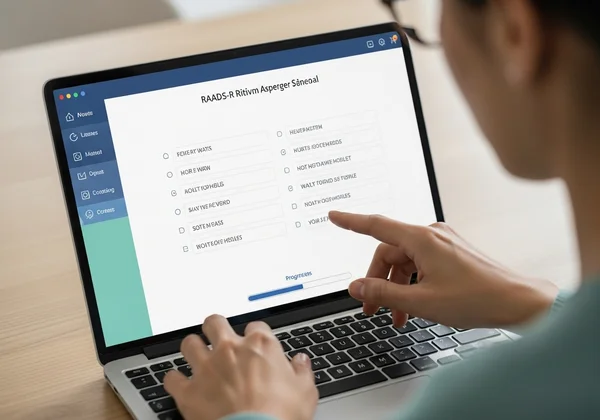RAADS-R Test & Autism Screening: Adult Signs & Self-Realization Stories
October 11, 2025 | By Elara Vance
Have you ever felt like you're operating on a different wavelength from everyone else? For many adults, a lifetime of feeling 'different' can be confusing and isolating. This persistent feeling often leads to a single, powerful question: Am I autistic? This article explores the common signs of autism in adults and shares insights from real late-diagnosis stories. If you're seeking clarity, these experiences can bring validation and guidance on your autism self-discovery journey.

Decoding the Past: Early Signs of Autism in Adults
Understanding yourself often begins by looking back. Many autistic adults only recognize their traits later, connecting a lifetime of experiences that once seemed unrelated. These traits are not flaws; they are simply different ways of experiencing the world. Recognizing them can be the first step toward self-acceptance.
The Social Labyrinth: Communication & Connection
For many autistic individuals, social interaction feels like a game where everyone else knows the rules. You might find small talk exhausting or struggle with non-verbal cues like tone and body language. However, this doesn’t mean you don’t want connection—it’s just a different style of communication.
Many autistic adults prefer deep conversations about interests over casual chat. This preference for direct honesty is common and deeply fulfilling. You can explore these traits further.
Sensory Worlds: Overload, Seeking, & Unique Perceptions
Does the hum of a refrigerator sound painfully loud? Do certain fabrics or tags feel unbearable? Many autistic people often experience the world with heightened sensitivity. This can lead to sensory overload from bright lights or loud noises. On the other hand, some people seek sensory comfort, like weighted blankets or rhythmic movement, to stay calm. Recognizing your sensory needs is an important step in understanding your neurotype.

Patterns, Routines, and Intense Interests
A structured, predictable environment can bring great comfort. Many autistic individuals rely on routines and feel uneasy with sudden changes. Their focus often extends to special interests—topics that spark intense curiosity and joy.
These passions are more than hobbies; they offer purpose and satisfaction. This deep focus is one of autism’s greatest strengths.
The Weight of Masking: Hidden Autism Traits
From childhood, many autistic people learn to "mask" their natural traits to fit in. This might involve forcing eye contact, memorizing social scripts, or hiding stimming behaviors. While masking is a powerful survival strategy, it is mentally and emotionally exhausting. Over time, masking leads to burnout and confusion about your identity. Therefore, learning to unmask safely is vital for mental health and self-understanding.
Shared Journeys: Real Late Diagnosis Autism Stories
The internet is filled with stories of adults who, in their 30s, 40s, or even later, have a moment of profound realization. They stumble upon an article or a video describing autism in adults and suddenly, their entire life clicks into place. These stories are powerful because they reflect experiences many others quietly share.
Finding Explanations: The Power of Self-Screening Tools
For many, the journey begins with a search for answers. This often leads to online resources and self-screening tools inspired by clinical assessments. Taking a test like a RAADS-R inspired screening can be an illuminating experience. It provides a structured way to reflect on your life experiences through the lens of common autistic traits. Seeing a score can be the first piece of external data that validates a lifetime of internal feelings, often prompting a deeper dive with a screening tool.

Validation and Community: You Are Not Alone
Discovering you might be autistic opens the door to a supportive global community. For the first time, you may meet others who share your traits and challenges. This sense of belonging replaces isolation with relief and connection. Hearing people say, “I thought I was the only one,” highlights the power of shared understanding. You truly are not alone.
The Clarity of a Label: When Everything Finally Makes Sense
For some, the word "autistic" might feel intimidating. However, for many late-diagnosed adults, it feels like freedom. It is not a label that confines; it is an explanation that liberates. It reframes past struggles not as personal failures but as sings of a neurodivergent mind navigating a complex world. As a result, this awareness builds self-compassion and allows you to live authentically.
Your Path to Autistic Self-Realization: What Comes Next?
If these signs resonate, you may be wondering what to do next. Your path is personal, and each step brings clarity. The goal is not to find a "cure" but to gain understanding and find tools for a more authentic and fulfilling life.
Is an Online Autism Screening Right for Your Questions?
An online screening is an excellent, low-pressure first step. It is a tool for self-reflection, not a diagnosis. A good screening can help you organize your thoughts and identify specific traits you may want to explore further. If you are ready to see how your own experiences line up with common autistic traits, you can start your assessment today. It is a private, insightful way to gather information by answering questions about your social, sensory, and cognitive experiences to gain a clearer perspective.
Embracing Your Neurotype: Resources & Support
Self-discovery is an ongoing process. After gaining initial insights, you can dive into books, blogs, and videos created by other autistic adults. Learning about concepts like autistic burnout, executive dysfunction, and accommodation needs can provide you with practical strategies for navigating daily life. Our platform offers valuable resources to support you on this journey, helping you embrace your unique neurotype and build a life that honors your needs.

Embracing Your Neurotype: The Path to Self-Understanding
Recognizing you may be autistic is life-changing. It marks the beginning of self-acceptance. The stories of others show us that it is never too late to find the language that describes your experience and the community that understands it.
Embracing your neurotype begins with understanding. While every journey is unique, tools like the RAADS-R-inspired test can help. Take that initial step towards clarity and begin your personalized exploration.
Frequently Asked Questions About Autism Self-Discovery
Can I self-diagnose autism with the RAADS-R test?
No, an online screening tool like the one inspired by the RAADS-R is not a clinical diagnosis. It is a valuable tool for self-reflection and information gathering. Think of it as a starting point that can help you decide if you want to seek a professional evaluation. You can use this online test to gain personal insight.
What are common 'aha!' moments for late-diagnosed autistic adults?
Common moments of realization often happen when learning about autistic masking, sensory processing differences, or the nature of special interests. For many women, learning how autism presents differently in females is a huge turning point. Realizing that their lifelong social "scripting" is a common autistic experience is another frequent 'aha!' moment.
Is the RAADS-R test accurate for identifying autism traits?
The RAADS-R (Ritvo Autism Asperger Diagnostic Scale-Revised) is a scientifically validated screening questionnaire designed to help identify autistic traits in adults. While no screening tool is perfect, it is considered a reliable instrument for self-reported traits. The results from our RAADS-R test can provide a strong indication of whether your experiences align with the autistic neurotype.
What is the difference between an online screening and a professional diagnosis?
An online screening is a questionnaire you complete yourself, providing a score based on your self-reported traits. A professional diagnosis is a comprehensive evaluation conducted by a qualified clinician, such as a psychologist or psychiatrist, which may involve interviews, observational assessments, and a review of your developmental history.
Where can I find support after identifying as potentially autistic?
Finding community is key. Look for online groups and forums led by autistic adults. Social media platforms have large communities under hashtags like #ActuallyAutistic. Reading books by autistic authors can also be incredibly validating. A screening can be this helpful online screening tool that sets you on the path to finding this supportive network.